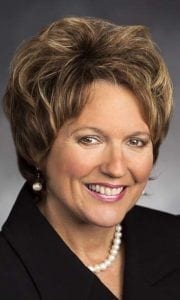 Premise that teachers aren’t being fairly compensated is a premise this writer doesn’t accept
Premise that teachers aren’t being fairly compensated is a premise this writer doesn’t accept
Teachers are not underpaid. There, I said it.
I get frustrated when narratives in our society are perpetuated to the point that they are generally accepted. The premise that our teachers are underpaid is one of those narratives. I’m sorry, but I don’t accept that premise.
Let me preface my thoughts with this. I am eternally grateful for the role many, many educators had in my life. I graduated from Stevenson High School in 1981 after spending my entire youth in the Stevenson-Carson School District. It was a wonderful time and a wonderful place to go through school and I was influenced by too many amazing teachers to recount. Some have passed away now, but I am still in contact with several of those tremendously talented, gifted and inspiring individuals.
I remember when I was in high school, I became aware of a salary range that most of my teachers fell within. My memory recalls that the common salary at that time, in that place, was about $25,000. For a youngster with visions of financial grandeur, it didn’t sound like much to me, even that long ago. But, I never heard a complaint from any of my teachers and none of them appeared to be in financial distress. They all had a roof over their heads, food on the table and all the recognizable advantages and benefits of fulfilling a moderately successful career.
Fast forward to 2018 and our daily reports that teachers in districts around Clark County are voting to go on strike if they don’t get more money. In most districts, teachers are asking for raises of 15-25 percent. For specific details on each district, follow ClarkCountyToday.com reporter Chris Brown’s seemingly daily coverage of the negotiations between area districts and the teachers.
I don’t want to put you to sleep with too many numbers, but here’s a few just to help make my point:
- In Woodland, where the teachers and district agreed on a contract that will give the teachers an increase of about 23 percent, starting teachers will now make $46,600 and the top end pay will increase to $87,832.
- In Battle Ground, the district offered a 6.5-percent increase which would bring the starting salary up to $46,599; the average salary to $73,000 and the top end salary to $90,154.
- In the Evergreen School District, the district’s recent offer of an 8.33 percent increase would bring the starting teacher salary to $50,687; the average salary to $79,000 and the top end salary to $96,345.
- The Ridgefield School District is offering its teachers a 15-percent increase, which would bring its average teacher salary up to $73,000.
According to the website MetaSalary, the median household income in Clark County is $58,262 and the national median household income is $51,914. Should a teacher with a required Master’s Degree make more than the median salary? Absolutely. But, are they underpaid? I think not.
Consider this information from Tiffany Couch, CEO and founder of Vancouver-based Acuity Forensics, shared on her Facebook page:

“Because I’m an infinitely curious person, I decided to look at the local school calendars and figure out the number of days a typical teacher works. I assumed they had to work 10 days before school starts and 2 days after (very generous, based on what I know about my teacher friends). I assumed they had to work all snow make-up days. Total days worked = 192. The rest of the year, they get 45 no-work days and 23 paid holidays. In other words, they get 68 no-work days, the equivalent of 13.5 weeks, or 3 months plus a week of no work per year (this does NOT include weekends).
Conversely, someone in my office works 236 days per year. This is 251 working days minus 15 days of PTO (fairly standard). They also get 9 days of holiday pay. In other words, they get 24 no-work days, the equivalent of 1 month and not quite another week of work.
The difference in working days is 45 days. 9 weeks. More than 2 months.
When you start to look at the equivalent hourly rate between a teacher who works 192 days and someone making the same in a full-time job the difference per hour is between 5 and 7 dollars, depending where on the scale the teacher falls.
And this is before medical, dental, and pension benefits. Each teacher gets a little more than 15% of their annual salary posted to a pension account (for a teacher making $50,000 this equates to $7,500 in additional benefit).
I also urge everyone to understand the pension liabilities and bond liabilities these schools are facing. I can assure you that most of their financial statements will show that they have severe underfunding in this regard – meaning they do not have the cash or assets to pay the pension obligations and bond payments if they were to come due. In fact, you will not find the totality of debt on those financial statements – unless you get to the separate schedule in the back.
I’m not one for making emotional decisions, I’m one for making informed decisions.
If your company needed to get its product to market, needed to pay its debt, and ensure that its people were paid, would you agree to double-digit raises? What would happen to your company if you did?”
It bothers me to see teachers on the roadside holding signs supporting their desire for larger pay increases. It’s just not dignified in my opinion. It’s an insult to a profession that I hold in high regard. And, at a time when funding all aspects of education — including facilities, support staff, extra curricular activities, etc. — doesn’t it seem self-serving for teachers to be so focused on themselves? If they get an exorbitant piece of the pie, what’s it going to mean to the students and the things that impact their educational experience? What happens to the desire to reduce class sizes?
It also bothers me that teachers are fighting this battle after the fact, meaning they decided to enter this profession and they knew the landscape when they did. Did they choose the profession because of a projected, or desired salary? Or did they choose the profession out of a heart of service to our youth? If they weren’t satisfied with the salary range, then they should have chosen a different career path.
Another one of my frustrations is that I think our local teachers are being influenced greatly by their unions, and when I say that, I mean at the state and even national level. I believe the teachers are getting bad information from their union leaders.
Consider this from Rep. Liz Pike, who posted the following on Facebook:

“Local teachers in SW WA are voting in droves to strike on the first day of school. Their complaint? 15% raises on top of the $5.5 BILLION property tax hike to fund public Education imposed by the WA legislature last year was not enough. Some of our local teachers want a 25% salary increase. MAKE NO MISTAKE; this is a ploy by WA teachers union to justify their existence in a POST-JANUS world. After this landmark US Supreme Court decision, state workers (including teachers) can no longer be forced to join a union as a condition of employment. The union is freaked out! If teachers quit the union, they are out of their billion-dollar-business!
This is shameful! Who gets a 25% pay raise in this day and age? If you are a teacher who voted for this nonsense, you deserve to be fired on the first day you strike! Period! Parents and taxpayers should start a counter protest on the first day of school calling on administrators to fire these union-thug-extortionists!
Clark County residents are still reeling from the statewide property tax hike. And these state workers want more! I say NO!
(See Janus v. American Federation of State, County, and Municipal Employees, Council 31, No. 16-1466, 585 U.S. (2018), was a landmark US labor law United States Supreme Court case concerning the power of labor unions to collect fees from non-union members. Under the Taft–Hartley Act of 1947, which applies to the private sector, union security agreements can be allowed by state law. The Supreme Court ruled that such union fees in the public sector violate the First Amendment, overturning the 1977 decision in Abood v. Detroit Board of Education that had previously allowed such fees).”
These thoughts will not please my educator friends, of which I hold in very high esteem. But, it needed to be said. I appreciate attempts by area residents like Pike and Couch to set the record straight and to not accept the popular narrative accepted by so many.
Also read:
Battle Ground teachers latest to approve a strike

Vancouver teachers join Ridgefield in vote to strike







